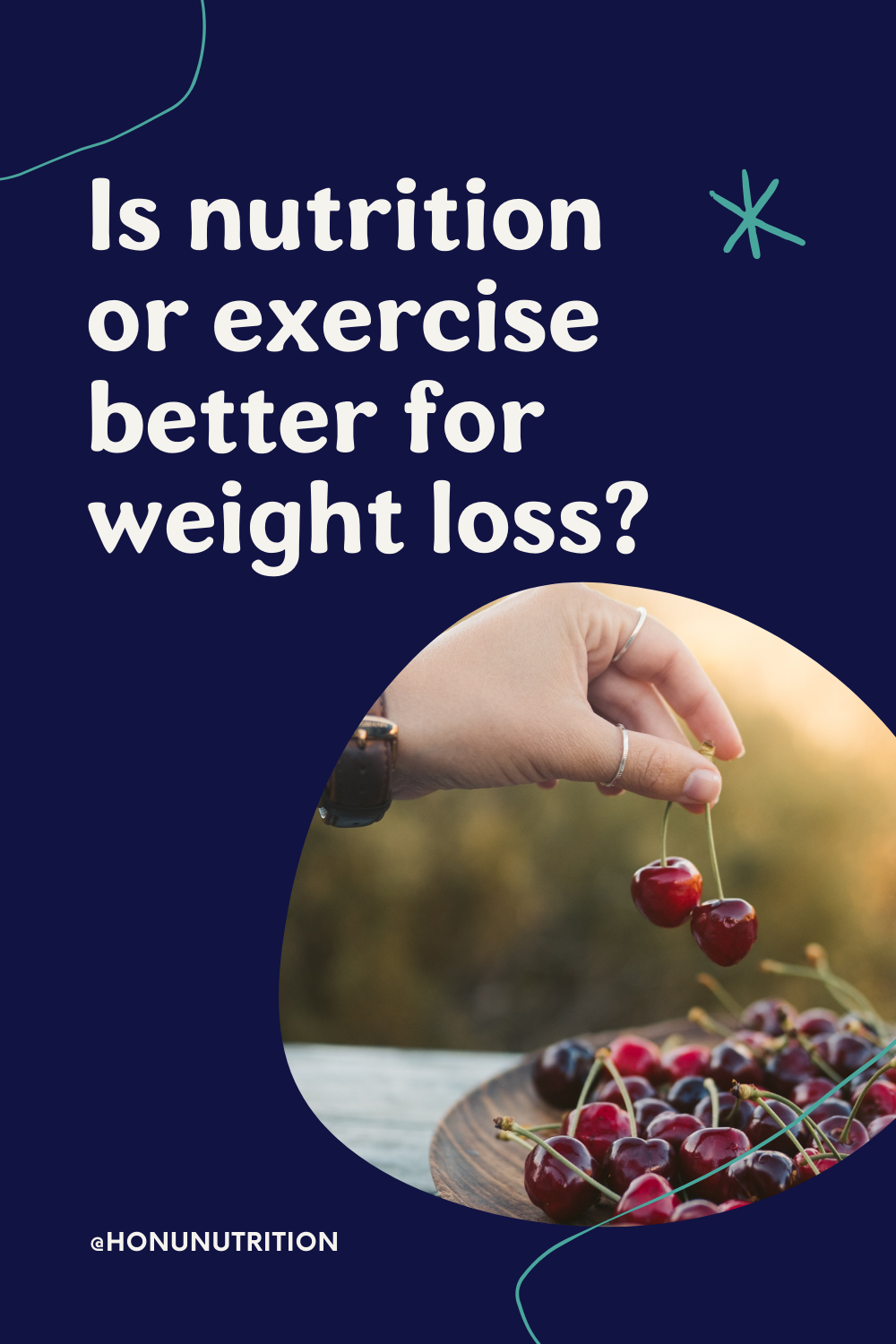Is nutrition or exercise better for weight loss?
As a nutritionist, I firmly believe in health at every size. I don’t recommend “diets” for weight loss, and I don’t use weight loss as a primary goal with my clients. That said, I’d like to acknowledge that if you’re focused on losing weight and getting in shape this January, you’re not alone. This time of year many of us take on radical food and exercise plans hoping to shed pounds. From 30-day cleanses to weight loss supplements, to new home gym equipment, you’ve likely noticed a few friends talking about their new #bodygoals on social media.
Here’s the truth: most people abandon their fitness resolutions by February for two reasons. One, the goal itself is unrealistic, and two, their chosen diet and exercise methods are so restrictive that they end up doing more harm than good.
Fortunately, it doesn’t have to be that way. I encourage you to change your language and mindset around losing weight and shedding pounds. Instead, introduce some sustainable habits that can support you in weight management and getting more physically active.
“What’s the best way to implement changes in your weight?”
Most clients ask me this question at some point, especially at the beginning of a new year. It’s no surprise. Our society puts so much importance on our weight and appearance that it can be hard to escape this thinking. As a nutritionist, I find it most effective to set our worries about weight aside and dig deeper. Weight is often a symptom of something else in our body that isn’t being nurtured. It’s only after we find and address the root cause that your body begins to let go of extra pounds.
If you’ve struggled to lose weight, unrealistic goals may be the culprit. Your body is meant to change throughout life, so there’s no use in forever trying to get your high school body back. If you’ve had a baby, you may find your clothes don’t fit the way they did before your pregnancy, even months or years later. These are natural life changes, and we can’t will them away with an extreme diet or exercise plan. Instead, we need sustainable goals that are appropriate for our age, biology, and lifestyle.
So what’s more important, nutrition or exercise?
There’s no perfect meal plan or workout that will whip you into shape all on its own. Both nutrition and exercise are important, and you need to find a balance between them that works for you. If we dive into a grueling exercise routine, spending hours on each workout and not taking enough rest days, we set ourselves up for injury, stress, and fatigue. These effects are made worse if you’re not eating enough to recover properly from those workouts.
As for nutrition, balance is again key. Any diet or cleanse that involves drastically cutting your calories, or cutting out entire food groups sets you up for failure. A client of mine shared that he tried intermittent fasting. For 35 days, he fasted for 16 hours and ate all of his meals in an 8-hour window. After strictly adhering to this diet he ended up 15 pounds heavier than when he started. He also noted that he made more mistakes in his work during that 35 days. As you can imagine, adding a tough exercise program on top of this diet would make matters worse because his body wouldn’t have enough fuel to recover workouts.
Create a balanced lifestyle for a healthier you in 2021
When it comes to nutrition and exercise, the first thing you should do is consult your nutritionist and/or doctor to address any underlying issues that may be affecting your health. The body holds onto weight as a way of protecting us, and it could be responding to ongoing inflammation, stress, exhaustion, over or undereating, too much or too little movement, etc. It’s important to address these first.
Keep in mind that any nutrition or exercise program that sits at the end of the spectrum is probably the wrong answer for your body. If it requires you to feel constantly hungry, cut out entire food groups, or exercise so much or at such an intensity that it interferes with your other daily activities, just say no. Thirty-day challenges are notorious for this kind of extreme thinking, so be wary of those.
Remember that with exercise, and sometimes nutrition too, it’ll take six or so months before you see any physical results. It’s best to focus on how you feel every day, and celebrate each little victory along the way.
Start simple. If you’re new to exercise or just getting back into it, pick an activity you genuinely enjoy like walking, hiking, weights, or yoga, and aim to do it for 15 minutes three or four days a week. Once you’ve made that a habit, bump it up to 20 minutes, then 30.
Support your exercise with balanced nutrition. Eat when you’re hungry, stop when you’re full, and avoid setting too many harsh rules for yourself. Your body needs food to fuel your workouts and to repair and build strong muscles afterward.
You can do this
Need support around creating and maintaining health and wellness goals? Contact me so I can help you.

